Papaya is a tropical fruit with a sweet and delicate flavor that is enjoyed all over the world. But this humble fruit is more than just a tasty treat; it is also packed with essential nutrients and health-promoting compounds that can improve digestion, boost the immune system, and even help heal skin damage. In this article, we will explore the many health benefits of papaya and how you can incorporate it into your diet and lifestyle for optimal health.
Key Takeaways:
- Papaya is a nutritional powerhouse that contains vitamins, minerals, and antioxidants that can improve overall health.
- Papaya enzymes, such as papain, can aid digestion by breaking down proteins and improving nutrient absorption.
- Papaya can boost the immune system with its high vitamin C content and other beneficial compounds.
- Papaya can also promote heart health, aid in weight loss, and support healthy skin.
- To incorporate papaya into your diet, try adding it to smoothies, salads, or eating it as a standalone snack.

Understanding Papaya Nutrition and Vitamins
Papaya is not only delicious but also packed with essential nutrients that contribute to overall health and well-being. This tropical fruit is rich in vitamins, minerals, and antioxidants that can help prevent chronic diseases and keep your body functioning optimally.
Papaya Nutrition Facts
One cup (140 grams) of fresh papaya contains:
| Nutrient | Amount |
|---|---|
| Calories | 55 |
| Carbohydrates | 14 grams |
| Fiber | 3 grams |
| Protein | 1 gram |
| Vitamin C | 144% of the Daily Value (DV) |
| Vitamin A | 31% of the DV |
| Folate | 13% of the DV |
| Potassium | 11% of the DV |
| Other vitamins and minerals | Calcium, magnesium, vitamin K, and small amounts of B vitamins |
As you can see, papaya is an excellent source of vitamin C, which is essential for a healthy immune system, wound healing, and collagen production. It also contains vitamin A, which is important for vision, skin health, and cell growth.
Papaya Antioxidants
Papaya is also rich in antioxidants, particularly carotenoids like beta-carotene and lycopene. These compounds can help protect your cells from damage caused by harmful molecules called free radicals.
Research has shown that a diet high in carotenoids may reduce the risk of chronic diseases like cancer, heart disease, and macular degeneration. Other antioxidants found in papaya include vitamin C, vitamin E, and flavonoids.
Papaya Enzymes
One of the unique aspects of papaya is its enzymes, particularly papain. Papain is a proteolytic enzyme, which means it can break down proteins into smaller peptides and amino acids.
Because of its digestive properties, papain is commonly used as a meat tenderizer and digestive aid. It can also help improve nutrient absorption and reduce digestive symptoms like bloating and constipation.
In addition to papain, papaya also contains other enzymes like chymopapain and caricain, which have similar digestive benefits.
Overall, papaya is an incredibly nutritious fruit that can provide a variety of health benefits. Whether you eat it fresh, dried, or in supplement form, adding papaya to your diet is a smart choice for optimal health.
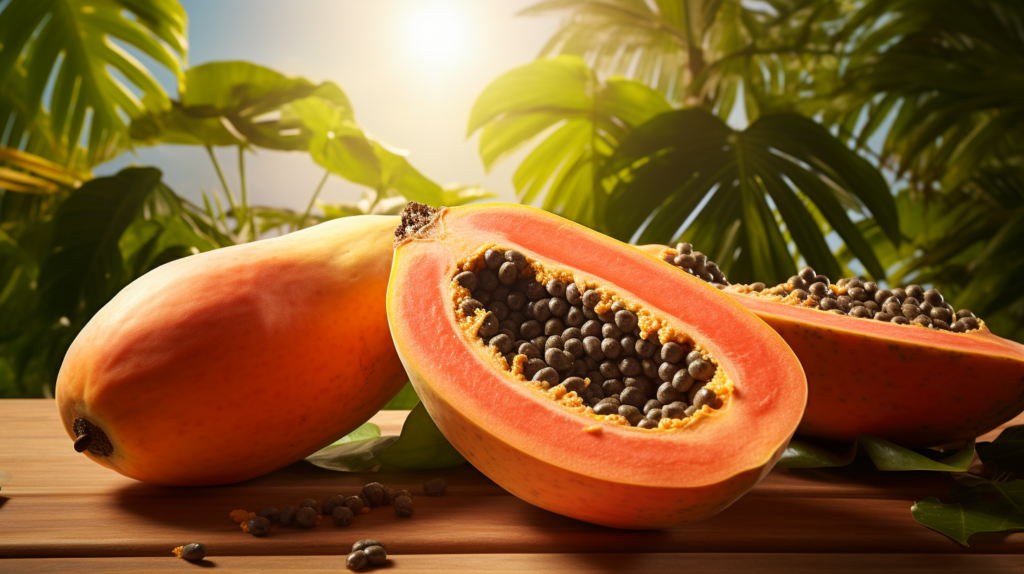
Unleashing the Power of Papaya Antioxidants
Papaya is loaded with antioxidants, which are compounds that help protect the body against harmful free radicals. Free radicals can cause cellular damage and are linked to a range of chronic diseases, including cancer, heart disease, and Alzheimer’s.
One of the key antioxidants found in papaya is vitamin C, which plays a vital role in the immune system and helps protect cells from oxidative stress. Papaya also contains other potent antioxidants, such as beta-carotene and lycopene, which have been shown to have anti-inflammatory and cancer-fighting properties.
Studies have shown that consuming papaya on a regular basis can help reduce the risk of chronic diseases and improve overall health. In fact, one study found that eating papaya daily for three months significantly improved antioxidant status in elderly adults.
In addition to its antioxidant properties, papaya is also a rich source of fiber, which can help promote regular bowel movements and improve digestion. This, in turn, can reduce inflammation in the gut and lower the risk of digestive disorders.
Overall, papaya is a potent source of antioxidants that can help protect against chronic diseases and improve overall health. Adding papaya to your diet can be a delicious and nutritious way to support your body’s natural defenses and maintain optimal well-being.
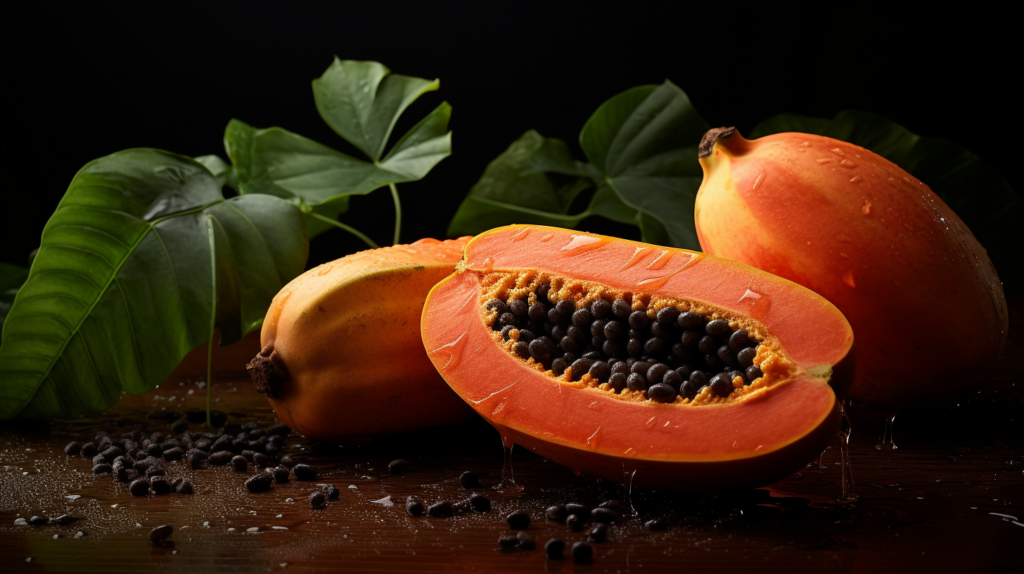
Enhancing Digestion with Papaya Enzymes
Papaya is not only a delicious fruit but also a natural digestive aid as it contains enzymes that help to break down proteins and improve nutrient absorption. The star enzyme in papaya is papain, which has been shown to support healthy digestion and reduce bloating and constipation.
When consumed regularly, papaya enzymes can improve digestion and promote healthy gut flora, which can lead to better overall health.
The Benefits of Papain
Papain is a proteolytic enzyme, which means it breaks down protein into smaller amino acids that are easier for the body to absorb and use for energy. This enzyme is particularly helpful for people who have trouble digesting meat or other protein-rich foods.
In addition to its digestive benefits, papain has been found to have anti-inflammatory and wound-healing properties. It has been used in traditional medicine to treat a variety of skin conditions, such as burns and cuts, and is now a common ingredient in many skincare products.
How to Incorporate Papaya Enzymes into Your Diet
The easiest way to enjoy the digestive benefits of papaya is to eat the fruit itself. Fresh papaya can be cut into cubes for a healthy snack or added to smoothies and salads. Papaya supplements are also available in pill form, though it’s always best to consult with a healthcare professional before taking any supplements.
For those who want to incorporate papaya enzymes into their diet on a regular basis, consider adding fermented papaya to your routine. Fermented papaya provides a higher concentration of papain and may have even greater digestive benefits than fresh papaya.
Potential Risks and Precautions
While papaya is generally considered safe for most people, some individuals may experience an allergic reaction to the fruit or supplements made from papaya. If you experience any signs of an allergic reaction, such as hives, swelling, or difficulty breathing, seek medical attention immediately.
Additionally, people who are taking certain medications, such as blood-thinning medications or antibiotics, should speak with their healthcare provider before consuming papaya supplements as they may interact with these medications.
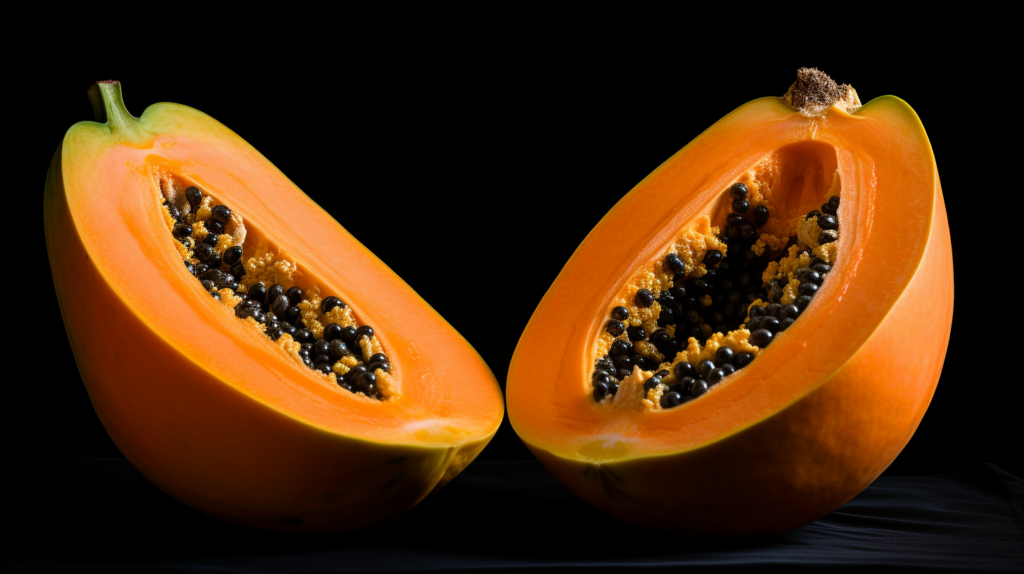
Boosting the Immune System with Papaya
Papaya is a powerhouse of nutrients that can significantly contribute to a healthy immune system. It is packed with vitamin C, an essential nutrient that helps the body fight off infections by stimulating the production of white blood cells.
Additionally, papaya contains other beneficial compounds, such as beta carotene and flavonoids, that have antioxidant and anti-inflammatory properties. These compounds help protect the body from oxidative stress and reduce the risk of chronic diseases.
The Role of Vitamin C in Boosting Immunity
Vitamin C is a water-soluble vitamin that plays a crucial role in enhancing the immune system. It promotes the production of antibodies and helps white blood cells function effectively to fight off infections. Vitamin C also helps to regenerate other antioxidants, such as vitamin E, which further strengthen the immune system.
One medium-size papaya provides approximately 147% of the daily recommended intake of vitamin C. Therefore, adding papaya to your diet can significantly improve your body’s ability to fight off infections.
The Benefits of Papaya Compounds on Immunity
Beyond the high levels of vitamin C, papaya also contains other beneficial compounds that help support the immune system. These include beta carotene, which the body converts into vitamin A, and flavonoids such as quercetin, kaempferol, and catechins.
Beta carotene plays a critical role in maintaining the integrity of the skin and mucous membranes, acting as a physical barrier against harmful pathogens. Flavonoids, on the other hand, have antioxidant and anti-inflammatory properties that help to reduce inflammation in the body and protect against chronic diseases.
Incorporating papaya into your diet can provide numerous health benefits and significantly improve your immune system’s function. Its high vitamin C content and beneficial compounds make it an excellent addition to a healthy lifestyle.
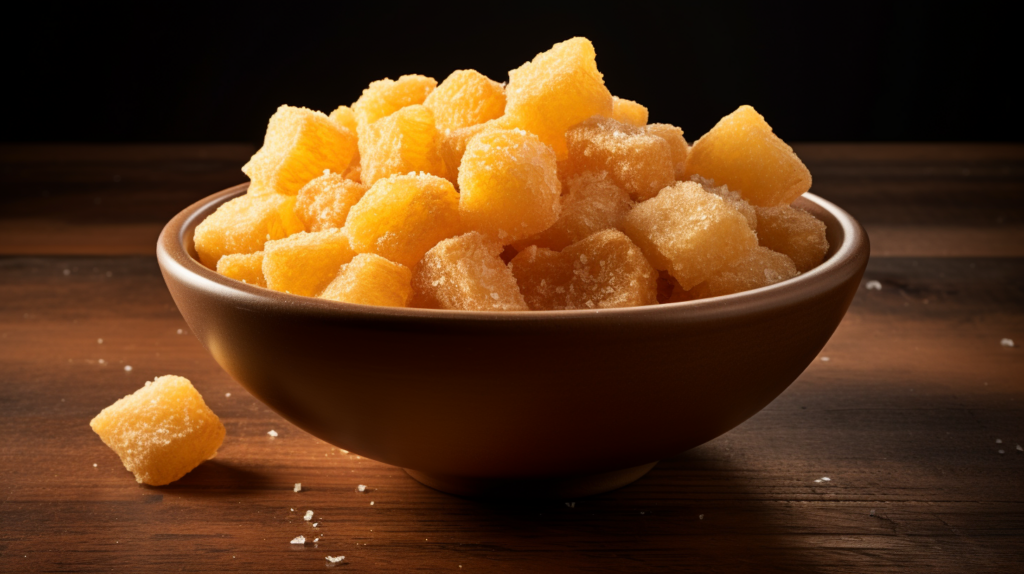
Nurturing Skin Health with Papaya
Papaya is a powerhouse of nutrients that can work wonders for your skin. Its high water content keeps your skin hydrated, while the antioxidants in papaya can help fight free radicals and reduce inflammation, which are some of the leading causes of skin damage and aging.
One of the key compounds in papaya that contributes to skin health is papain, an enzyme that helps break down and remove dead skin cells. This process promotes cell turnover and helps reveal smoother, brighter skin.
In addition to papain, papaya also contains vitamin C, which is essential for collagen production. Collagen is a protein that gives your skin its structure and elasticity, and a deficiency in vitamin C can lead to weakened collagen and premature aging.
Papaya also contains vitamins A and E, which help protect the skin from harmful UV rays and environmental pollutants.
Using papaya topically as a facial mask or incorporating it into your diet can lead to improved skin texture, reduced inflammation, and a brighter, more youthful complexion.
Aiding Weight Loss Efforts with Papaya
Papaya is a great addition to any weight loss diet. Not only is it low in calories, but it is also high in fiber, making it an excellent choice for promoting satiety and regulating digestion. In addition, papaya contains an enzyme called papain, which assists in breaking down proteins and enhancing nutrient absorption.
One of the best ways to incorporate papaya into a weight loss diet is to use it as a healthy snack option. A serving of papaya can be a great alternative to higher-calorie snacks and can help keep you feeling full between meals. Additionally, papaya can be added to smoothies or salads for a flavorful and nutritious boost.
- Try this delicious papaya smoothie recipe:
| Ingredients: | 1 small papaya, peeled and diced |
|---|---|
| 1 banana, sliced | |
| 1/2 cup Greek yogurt | |
| 1/4 cup almond milk | |
| 1 tsp honey |
- Add all ingredients to a blender and blend until smooth.
- Pour into a glass and enjoy!
While papaya is generally safe to consume, it is important to note that those with a latex allergy may also be allergic to papaya. Additionally, papain may interfere with certain medications, so it is important to consult with a healthcare provider before incorporating large amounts of papaya into your diet.
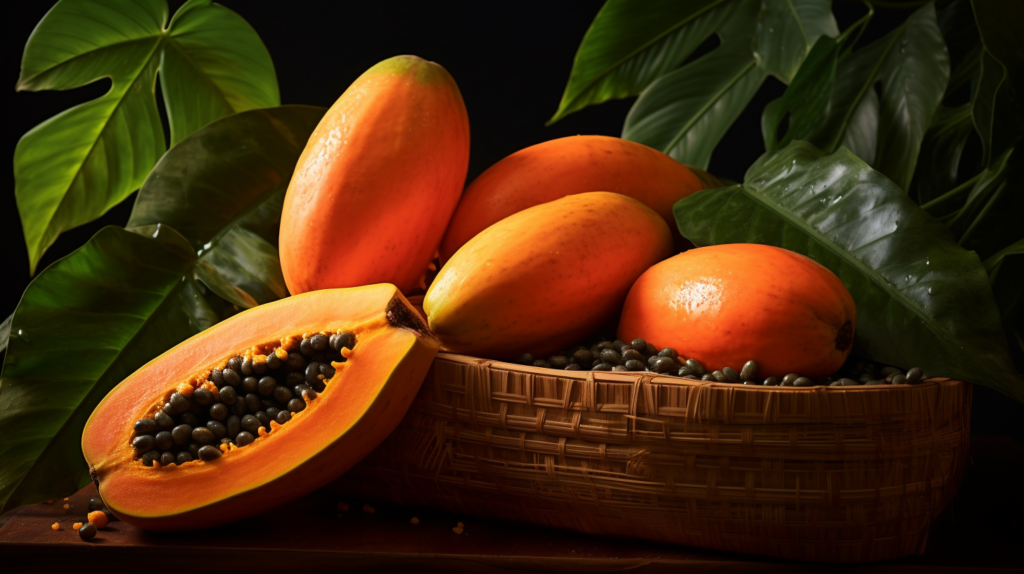
Promoting Heart Health with Papaya
Papaya is not only a delicious tropical fruit but also a heart-healthy food that can contribute to reducing the risk of heart disease. Several studies have shown that consuming papaya regularly can have positive effects on various cardiovascular risk factors, including cholesterol levels, blood pressure, and inflammation.
The high amount of fiber and potassium in papaya can help lower blood pressure, which is a significant risk factor for heart disease. Potassium-rich foods are also known to counteract the effects of sodium in the body, which can increase blood pressure and harm the heart.
Papaya also contains antioxidants, such as vitamin C and beta-carotene, which can help protect against the formation of oxidative stress and inflammation, two factors that can contribute to the development of heart disease. In addition, studies have shown that papaya extract can lower cholesterol levels and reduce the risk of plaque buildup in the arteries.
| Heart-Healthy Nutrients in Papaya | Amount per 1 cup (140g) of Papaya |
|---|---|
| Fiber | 2.5g |
| Potassium | 360mg |
| Vitamin C | 94mg |
| Beta-Carotene | 2760mcg |
It’s important to note, however, that while papaya can be a heart-healthy addition to one’s diet, it should not be considered a cure or sole treatment for heart disease. Incorporating papaya into a balanced, nutrient-dense diet along with other heart-healthy habits, such as regular physical activity and stress management, can contribute to maintaining a healthy heart and reducing the risk of heart disease.
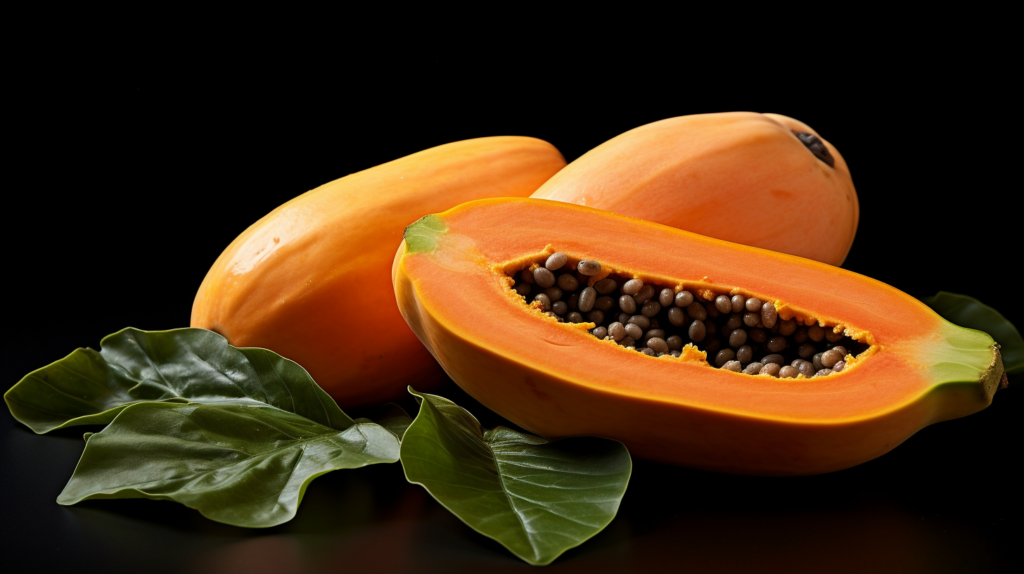
Incorporating Papaya into Your Diet and Lifestyle
Adding papaya to your diet is an easy and delicious way to support your overall health and well-being. Here are some tips on how to incorporate this nutritious fruit into your daily routine:
1. Enjoy Papaya as a Snack
One of the simplest ways to incorporate papaya into your diet is to enjoy it as a snack. Simply slice the fruit and eat it as is, or pair it with nuts or Greek yogurt for a satisfying and nutritious snack.
2. Add Papaya to Smoothies and Juices
Papaya can also be blended into smoothies and juices for a refreshing and healthy beverage. Combine papaya with other fruits and vegetables like banana, spinach, and coconut water for a delicious and nutritious drink.
3. Use Papaya in Salads and Salsas
Papaya adds a sweet and tangy flavor to salads and salsas. Simply dice the fruit and add it to your favorite salad or salsa recipe for a burst of flavor and nutrition.
4. Incorporate Papaya into Main Dishes
Papaya can also be used in a variety of main dishes. Try grilling it alongside chicken or fish, or add it to a stir-fry for a unique and tasty twist.
5. Choose Ripe Papayas
When selecting papayas, look for ones that are ripe and slightly soft to the touch. They should also have a sweet and fruity aroma. This ensures that you get the maximum nutritional benefits and flavor.
By incorporating papaya into your diet and lifestyle, you can enjoy a variety of health benefits, from supporting digestive health to promoting skin health and more.
Exploring Potential Risks and Precautions
While papaya is generally considered safe for most people, there are a few potential risks and precautions to be aware of.
Firstly, if you have a known allergy to latex, there is a possibility of a cross-reaction to papaya, as both contain similar proteins. Symptoms of an allergic reaction may include itching, swelling, hives, and difficulty breathing. If you experience any of these symptoms after consuming papaya, seek medical attention immediately.
Secondly, papaya contains papain, a type of enzyme that may interact with certain medications. If you are taking blood-thinning medications, such as warfarin, or antibiotics, such as tetracycline, it is best to consult with your healthcare provider before consuming papaya or papaya supplements. Papain may also interfere with protein digestion when consumed in excess, leading to stomach upset and discomfort.
Finally, it is advisable to choose ripe papayas for consumption, as unripe or underripe fruits contain high levels of latex and papain, which may cause digestive problems and worsen existing conditions like ulcers and gastritis.
By being aware of these potential risks and taking necessary precautions, you can enjoy papaya’s numerous health benefits safely.
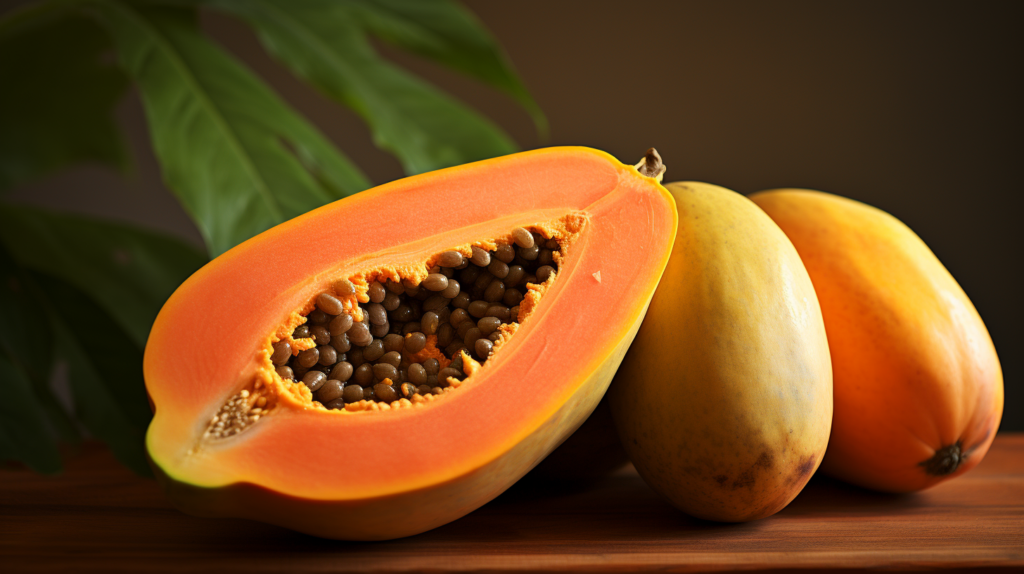
Conclusion
Papaya is a superfood with a host of health benefits. Incorporating papaya into your diet and lifestyle can lead to improved digestion, healthier skin, stronger immune system, and better heart health. Its unique blend of vitamins, minerals, antioxidants, and enzymes make it a powerful addition to any healthy diet.
Remember to choose ripe papayas, which are yellow-orange in color and yield to gentle pressure. Avoid papayas with bruises, soft spots, or mold. You can enjoy papaya as a snack, in smoothies, salads, or as a side dish.
If you have any concerns or medical conditions, consult your healthcare provider before adding papaya to your diet. Some individuals may be allergic to papaya, and it may not be suitable for everyone, especially for those taking certain medications.
Incorporating papaya into your daily routine is a simple and delicious way to improve your health and overall wellbeing. So go ahead and enjoy these sweet and juicy fruits as part of your balanced diet, and reap the many benefits that papaya has to offer.
FAQ
Q: What are the health benefits of papaya?
A: Papaya offers numerous health benefits, including improving digestion and healing skin damage. Its unique combination of nutrients, antioxidants, and enzymes contribute to these positive effects.
Q: How does papaya improve digestion?
A: Papaya contains enzymes, such as papain, which help break down proteins and improve nutrient absorption. It also has high fiber content, promoting regular bowel movements and preventing digestive issues.
Q: Can papaya help with weight loss?
A: Yes, papaya can support weight loss efforts. It is low in calories and high in fiber, which promotes satiety and helps control appetite. Additionally, its digestion-improving properties aid in the efficient breakdown of nutrients.
Q: Does papaya boost the immune system?
A: Absolutely! Papaya is rich in vitamin C, a powerful antioxidant that strengthens the immune system. It also contains other beneficial compounds that enhance immune function and protect against infections and diseases.
Q: What are the benefits of papaya for the skin?
A: Papaya can nurture skin health in various ways. Its enzymes and antioxidants promote collagen production, reduce inflammation, and improve skin texture and appearance. Regular consumption or topical application can yield visible results.
Q: Are there any precautions or risks associated with consuming papaya?
A: While papaya is generally safe for most people, individuals with known allergies to latex or papain should avoid it. Additionally, it may interact with certain medications, so it’s advisable to consult a healthcare professional if you have any concerns.














